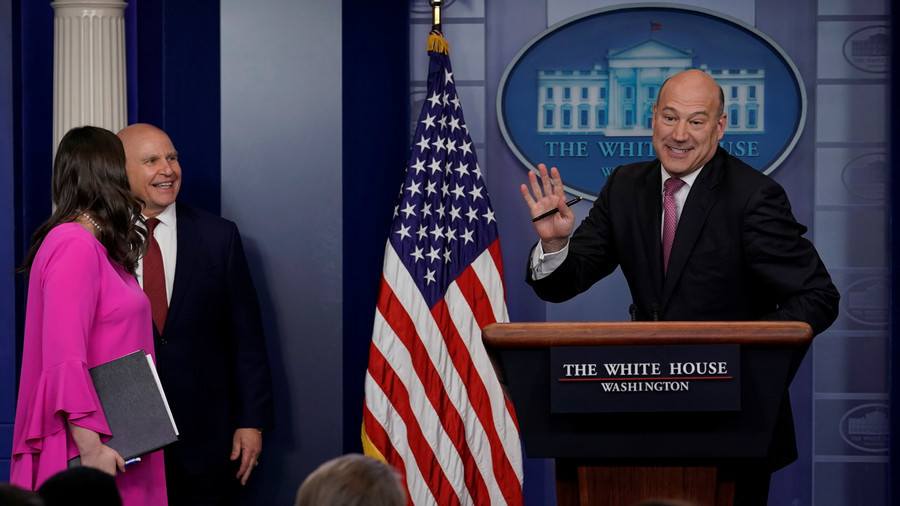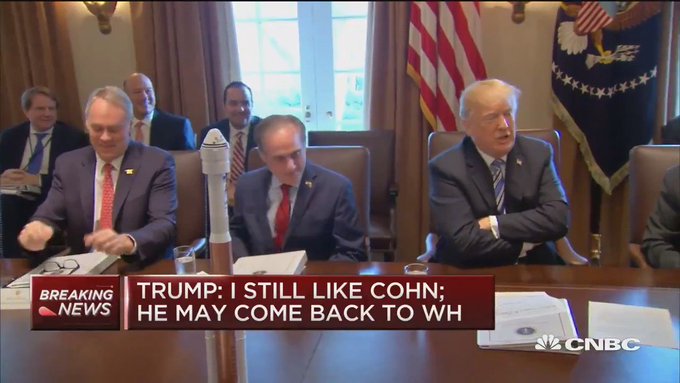‘Make millions and come back’: Revolving door alive & well in Trump’s Washington

President Donald Trump’s promise to “drain the swamp” in Washington may be getting mired in the same muck his predecessors struggled with, as lobbyists keep getting government jobs and officials leave to make fortunes elsewhere.
Trump’s chief economic adviser Gary Cohn resigned on Wednesday, after disagreeing with the president on the issue of steel and aluminum tariffs. At a Thursday cabinet meeting, Trump chided Cohn for being a “globalist” but wished the former Goldman Sachs executive well in his future endeavors.
“He’s gonna go out and make another couple hundred million, then he’s going to maybe come back” in some other capacity, Trump said.
If Cohn decides to parlay his year-long White House stint into lobbying, he might come up against Trump’s executive order prohibiting former administration officials from lobbying for five years after leaving office, and lobbying for foreign entities in general.
Per Executive Order 13770, issued on January 28, 2017, former lobbyists cannot work for the government on matters they lobbied or otherwise worked on unless at least two years have passed. Administration officials are barred from lobbying for five years after leaving office, and can never work as agents of a foreign government.
In the first year of the Trump administration, the White House counsel has issued at least 24 ethics waivers to executive branch officials, AP reported on Thursday. In comparison, the Obama administration issued almost 70 waivers over the eight years.
At least 187 lobbyists have been hired by the Trump administration, according to a report released Wednesday by the Democrat-friendly government watchdog ProPublica. In his first year, Trump hired 18 recent lobbyists, while Obama had hired 14, ProPublica noted.
The second term of George W. Bush’s presidency was marked by the scandal involving lobbyist Jack Abramoff and several of his partners, who overbilled their Native American clients and even secretly lobbied against them to drive up profits.
The scandal led Bush to sign a 2007 law banning members of the House from lobbying Congress for one year after leaving office and imposing a two-year moratorium on senior executive branch officials and members of the Senate. The law was proposed by Democrats, but received enough Republican support to be veto-proof. Barack Obama, then a US senator, called it “the most sweeping ethics reform since Watergate.”
Obama also came to Washington with a promise to rein in lobbyists.
“When I’m president of the United States, if you want to work for my administration, you can’t leave my administration and then go lobby,” he said while campaigning in Iowa in August 2007.
In practice, the executive order he signed in 2009 applied only to registered lobbyists, meaning people who spend 20 percent or more of their time at work directly lobbying. It also only covered political appointees, leaving career bureaucrats free to seek their fortunes in the private sector.
The loopholes were big enough for officials such as intellectual property czar Victoria Espinel and Center for Medicare and Medicaid Services head Marilyn Tavenner to slip right through, Politico noted in 2015.
The fact-checking outfit PolitiFact described Obama’s pledge as a “broken promise.”



0 Comments:
Post a Comment
Subscribe to Post Comments [Atom]
<< Home